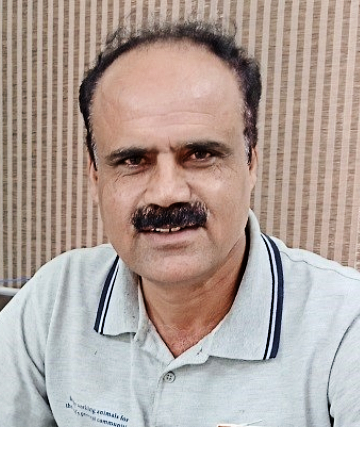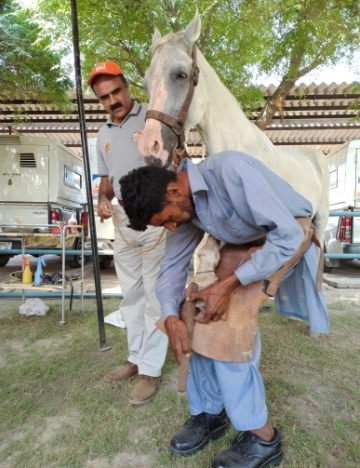Dr Muhammad Javaid Khan, Animal Healthcare Manager
A veterinarian in Lahore, Muhammad progresses Brooke Pakistan’s service provision and strategic healthcare goals. He provides context-specific knowledge, and utilises his veterinary skills to focus on internal and external animal health capacity building. He is the main contact for our Global Farriery Project and Compassionate Handling project, and is the technical representative in the International Research Group.

- Strengthening animal health systems
- Capacity building of Brooke Pakistan staff
- Veterinary training
- Veterinary curriculum development
- Animal Health Mentoring Framework
- Farriery Mentoring Framework
- Advanced TFAL (training and facilitating adult learning)
- Clinical reasoning
- Evidence-Based Veterinary Medicine (EBVM)
Qualifications
-
Doctor of Veterinary Medicine (Distinction) (Sindh Agriculture University, Pakistan)
-
Master of Science in Veterinary Surgery and Medicine (Sindh Agriculture University, Pakistan)
Publications
- Contributed to data collection in research study: Broster, C.E., Burn, C.C., Barr, A.R.S. & Whay, H.R. (2009). The range and prevalence of pathological abnormalities associated with lameness in working horses from developing countries. Equine Veterinary Journal. 41 (5) 474-481.
- Shah, S., Chaudhary, A., Abbas, S., Khan, M. & Eager, R. (2007). Risk assessment report: Peshawar study of shoulder, wither, spine and girth lesions. Brooke Hospital for Animals.
Dr Khan examining a donkey's eyes and advising the owner on preventing eye diseases.
The participant was so happy and announced that the skills he learned in these three days of vet training surpassed his 10 years of experience as a vet.
Hobbies
I enjoy doing yoga exercises and drawing sketches of animals, especially horses.

As a facilitator in one of our organised veterinary trainings with government veterinarians, I realised that a senior participant was least bothered to take interest. He was a practicing vet in the field, and was proud of his significant experience with animals.
The first day of the training covered topics such as equine behaviour, animal welfare domains, compassionate handling and minimum physical restraint. During group work, brainstorming exercises and practical sessions on live animals, the participant was asked to take the lead in presenting to the group. He was encouraged and supported, and started to actively participate in leaning and sharing.
On the last day, after individual and group feedback was collected, the participant was so happy and announced that the skills he learned in these three days of vet training surpassed his 10 years of experience as a vet and would further polish these skills to be a competent and compassionate vet.
Best part of your job
There is a conducive leaning environment that further encourages me to adapt new learning and improve my skills as a vet expert.
Well-planned training sessions with precise objectives, hands-on training, mentoring and positive feedback to trainees is the best part of my job. It's great watching skills being transferred to trainees and then observing these trained animal health practitioners applying the enabling skills as animal welfare advocates and expert vets.
The other best part is that there is always the best possible support available from technical leads in animal health and welfare in Brooke UK. There is a conducive leaning environment within the country programme that further encourages me to adapt new learning and improve my skills as a vet expert.
How did you get your job?
I started working with Brooke Pakistan as a Junior Veterinary Officer through an advertisement and was promoted to Veterinary Officer, then Senior Veterinary Officer after annual reviews, tests and interviews. Later, I was supervising our partnership with Sindh Rural Support Organisation (SRSO), at Brooke South, Pakistan, and further gained experience of working in partnership. An internal advertisement was announced and I was selected by a panel of interviewers as Animal Healthcare Manager. Prerequisites for the post was Doctor of Veterinary Medicine with a cumulative GPA of 3.5 and above, minimum work experience of 10 to 15 years, and qualified as Advance TFAL.
